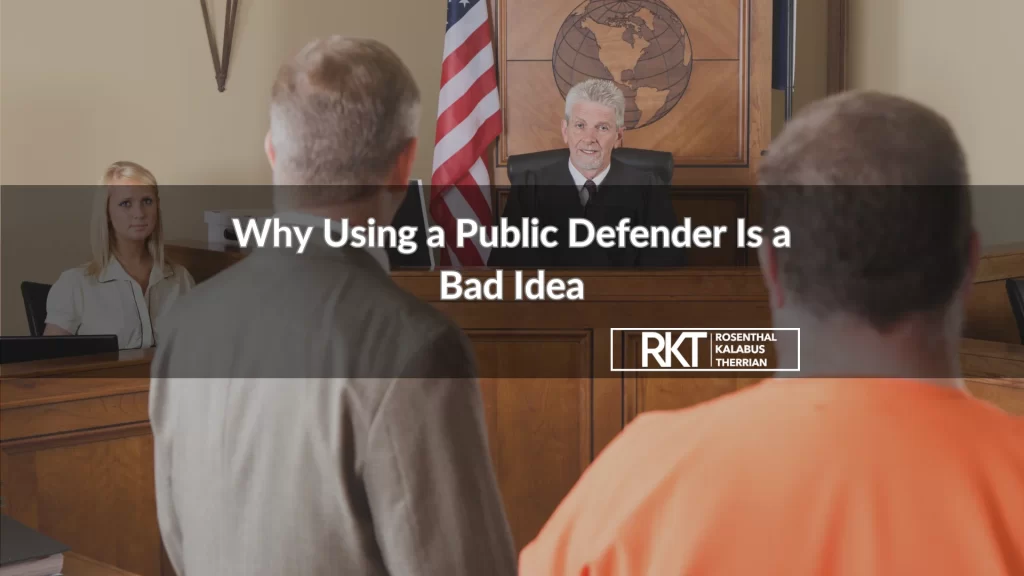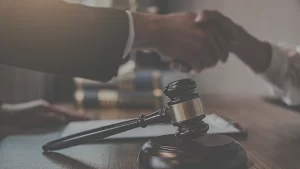
The Sixth Amendment of the United States Constitution guarantees everyone the right to an attorney during criminal cases. A U.S. Supreme Court case, decided almost 60 years ago (Gideon v. Wainwright) held that if a person wants an attorney but cannot afford one, the state must provide them with an attorney at no cost. Justice Hugo Black wrote in the opinion that “fair trials before impartial tribunals in which every defendant stands equal before the law . . . cannot be realized if the poor man charged with a crime has to face his accusers without a lawyer to assist him.”
However, if you can afford a private attorney to defend you in your criminal case, you should hire one. Although public defenders’ offices do their best and, in some cases, do outstanding work. If there is any way you can avoid a court-appointed lawyer, you should do so.
What Is Wrong with Public Defenders?
As attorneys, nothing. Public defenders go to the same schools. They pass the same bar exams. They practice before the same judges as their private law firm colleagues. Unfortunately, they have handicaps that you, as a criminal defendant, should not have to deal with.
Heavy caseloads
It is common for an overworked public defender to handle 200 to 300 cases simultaneously. In big jurisdictions, they may handle even more. No matter how good the attorney, they will not be able to give your case the time and attention it deserves.
Lack of resources
Despite Justice Black’s fine words, the goal of providing equal representation did not come with equal funding. Public defenders’ offices are chronically short of money and often lack funds for specialized expert testimony or even basic forensic testing.
Lack of staffing
Along with poor funding, the public defenders’ offices often lack adequate staff. This has been worsened by the COVID pandemic. A law office without enough paralegals, secretaries, and legal assistants does not operate at peak efficiency.
Lack of specialization
Although public defenders try to focus on certain types of cases within their own offices, they must take any case they are given in the name of speed. This means they must take everything from DUIs to theft if necessary. High turnover within the office means that attorneys must keep being retrained for the same areas over again.
Lots of plea bargains
It’s an unfortunate fact that many people in jail really did do the crime they are charged with. They want to plead and get out just as much as the public defender wants to get them out. A side effect is that public defenders may spend very little time trying cases and more time discussing plea deals with prosecutors and clients.
You can have a successful case with a public defender and even win, but your chances are better with a private attorney who has the time, resources, and experience to devote to your case.
Why Using a Public Defender Is a Particularly Bad Idea If You’re Currently Incarcerated
While public defenders play a vital role in upholding justice, the impediments they face can be more pronounced for clients already behind bars. This is not a reflection on the dedication or competency of public defenders but rather a consequence of the systemic constraints within which they operate. Here are some key factors that make using a public defender a bad idea if you’re currently incarcerated.
- Limited Accessibility—For incarcerated individuals, accessibility to an attorney is crucial. Public defenders, grappling with colossal caseloads and stretched resources, often struggle to maintain regular contact with their incarcerated clients. This lack of consistent communication can hinder the public defender’s understanding of your case and their ability to establish a robust defense strategy.
- Strategic Disadvantages—Being incarcerated can place you at a strategic disadvantage in collecting evidence, contacting witnesses, or performing other tasks essential for building a defense. Overburdened public defenders often lack the time and resources to offset these disadvantages effectively. Conversely, a private attorney backed by a proficient team and ample resources can actively work to alleviate these setbacks.
- Limited Negotiation Power—Public defenders are often less able to leverage favorable plea bargains for incarcerated clients. The perception of having a defendant already in custody can embolden prosecutors to be less lenient in negotiations, deeming the defendant as having lower bargaining power. Unencumbered by excessive caseloads, a private attorney has the time to negotiate more aggressively and effectively on behalf of an incarcerated client.
Can I Fire My Public Defender?
 The short answer is no, you can’t. Not unless you’re getting a private attorney. One major problem with having a public defender is that once you’ve been assigned one, you’re stuck with them until your case ends.
The short answer is no, you can’t. Not unless you’re getting a private attorney. One major problem with having a public defender is that once you’ve been assigned one, you’re stuck with them until your case ends.
In some rare cases, defendants have been able to show that their public defender is simply unable or unwilling to defend them, but this is not the norm. One of those rare cases was the unfortunate defendant whose court-appointed attorney slept through his murder trial and the reading of his death sentence. An appellate court upheld the death sentence, saying that sleeping through parts of the trial did not constitute inadequate representation of counsel.
The U.S. Circuit Court later overturned this sentence, granting the defendant a new trial. The U.S. Supreme Court refused to accept Texas’s appeal of the 5th Circuit’s decision. The defendant eventually took a plea deal that left him in prison for life — 29 years after the original trial began.
How Do I Find an Affordable Criminal Defense Attorney?
Don’t give up if you don’t find an attorney right away. Not everyone needs the Dream Team, and not every attorney charges Dream Team fees.
At Rosenthal Kalabus & Therrian, our Collin County criminal defense lawyers understand that not everyone has unlimited funds, but when you’re facing criminal charges, you want the best representation you can get. We offer you a free initial consultation so that we can discuss your case and explain how it is likely to proceed and what the fees might be. We’ll work with you for the best possible outcome without over-promising what is likely to happen.
Call us today at (972) 369-0577 or fill out our contact form, and someone will get back to you immediately. We’re here to fight for you. Don’t wait to make that call.
Related posts
How Do I Know if I Have a Good Defense Lawyer?